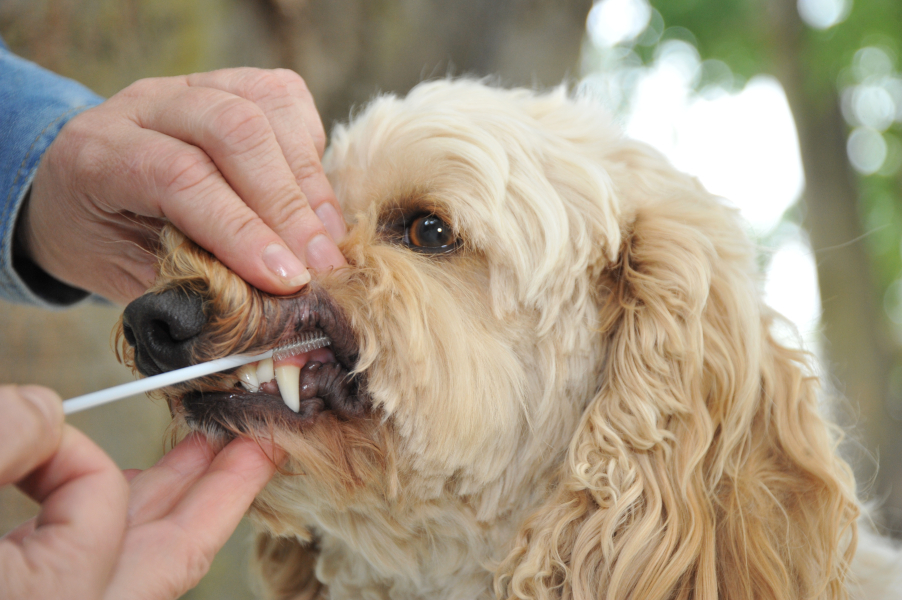Quick Summary
Click here for Price and Turnaround Time
Phenotype: Progressive muscular weakening of dogs is first evident at 6-8 weeks of age. Affected dogs often have a choppy gait with a progressive stiffening of the legs during ambulation. Exercise exacerbates the symptoms.
Mode of Inheritance: Autosomal recessive
Alleles: N = Normal, CMS = congenital myasthenic syndrome variant
Breeds appropriate for testing: Golden Retriever and Golden Retriever crosses
Explanation of Results:
- Dogs with N/N genotype do not have the variant associated with congenital myasthenic syndrome found in Golden Retrievers.
- Dogs with N/CMS genotype are carriers of the congenital myasthenic syndrome variant found in Golden Retrievers but will not develop congenital myasthenic syndrome. If two carriers are mated, approximately 25% of the puppies are predicted to develop disease and 50% are predicted to be carriers.
- Dogs with CMS/CMS genotype are homozygous for the congenital myasthenic syndrome variant found in Golden Retrievers and are expected to develop this progressive neuromuscular disease.
Results of this test can be submitted to the OFA (Orthopedic Foundation for Animals)
Golden Retriever Health Panel
$135 per animal
Sample Collection
Dog DNA tests are carried out using cells brushed from your dog's cheeks and gums. The preferred cytology brushes are sent to you by mail, or you may provide your own brushes. For accepted alternative brushes, click here
We recommend waiting until puppies are at least three weeks old before testing.

Step-By-Step:
- Make sure the dog has not had anything to eat or drink for at least 1 hour prior to collecting sample.
- When swabbing puppies, isolate each puppy from the mother, littermates and any shared toys for 1 hour prior to swabbing. Puppies should not have nursed or eaten for 1 hour prior to collecting sample.
- If collecting samples from more than one dog, make sure to sample one dog at a time and wash your hands before swabbing another dog.
- Label brush sleeve with name or ID of dog to be sampled.
- Open brush sleeve by arrow and remove one brush by its handle.
- Place bristle head between the dog’s gums and cheek and press lightly on the outside of the cheek while rubbing or rotating the brush back and forth for 15 seconds.
- Wave the brush in the air for 20 seconds to air dry.
- Insert brush back into sleeve.
- Repeat steps 5 - 8 for each unused brush in sleeve on a fresh area of cheek and gums. Make sure to use and return all brushes sent by the VGL. In most cases, it will be 3 brushes per dog. If using interdental gum brushes, please note that the VGL requires 4 brushes per dog and only moderate or wide interdental gum brushes are accepted.
- Do not seal brushes in sleeve.
- Place all samples in an envelope and return to the address provided.
ATTENTION:
- Do not collect saliva/drool – the key to obtaining a good sample is getting cheek cells on the swab
- Do not rub swab on the dog’s tongue or teeth – this will result in poor quality sample
- Do not collect a sample from a puppy that has recently nursed – the mother’s genetic material can rub off on the puppy’s mouth and contaminate the sample
Dogs affected with congenital myasthenic syndrome (CMS) demonstrate generalized muscle weakness with symptoms becoming evident at 6-8 weeks after birth. The symptoms of CMS are often exacerbated with exercise. The gait of affected pups has been described as choppy with increasingly short strides and stiffening of the legs. Unlike myasthenia gravis (another neuromuscular condition), megaesophagous (loss of motility of the esophagus) is not evident.
A variant in the collagen‐like tail of the asymmetric acetylcholinesterase gene (COLQ) was identified as the likely cause for congenital myasthenic syndrome (CMS) seen in Golden Retrievers. This variant, c.880G>A, is predicted to result in a change in the functional product of this gene by altering the protein sequence from glycine to arginine at amino acid position 294(p.G294R). Muscle biopsies from an affected litter of puppies (four puppies in total) homozygous for this variant lacked normal gene product. While the precise functional effect of this mutation has not been determined, the protein product is responsible for clearing acetylcholine from the neuromuscular junction thus enabling the successful ending of a muscle contraction. It is hypothesized that this variant affects the normal gene product through one of multiple mechanisms and thus acetylcholine cannot be cleared from the neuromuscular junction and this leads to muscle fatigue.
Congenital myasthenic syndrome in the Golden Retriever is inherited in an autosomal recessive fashion. Two copies of the variant must be present for the disease to manifest, and both sexes are equally affected.
In the initial study that identified the causal genetic variant, researchers did not find this variant in other Golden Retrievers, suggesting that it may be limited to a specific line or is at very low frequency in the population. Research to investigate the allele frequency in the Golden Retriever population is on-going at the VGL. Testing for this variant can assist veterinarians with diagnosis and helps breeders identify carriers among breeding stock to select appropriate mates that will reduce the risk of producing affected offspring. To avoid the possibility of producing affected puppies, matings between known carriers should be avoided. Dogs who genotype CMS/CMS should be clinically evaluated.
